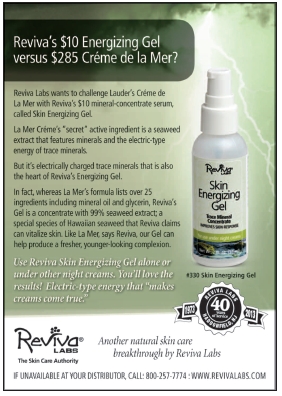Television personality and surgeon Mehmet Oz, M.D., made an example of one of his guests on a February 2012 episode of The Dr. Oz Show. That day, the audience was asked to guess the age of a particular woman in the crowd.
After a vote, audience consensus rounded her age to about 53 years old, which was a huge disappointment to the 44-year-old. Dr. Oz had a suggestion for her skin, which caused her to look seasoned beyond her age. His answer was topical peptides (1).
Peptides naturally aid in supporting youthful-looking, healthy skin, and are largely found in natural anti-aging creams. Since these peptides are complex and often found in premium skin care products with higher price points, shoppers will want to know if/how they work and whether they’re worth the money.

How They Work
Peptides aid the skin in maintaining a healthy glow by helping stimulate collagen production. Collagen supports firm skin as a building block of the epidermis and is made up of long strands of amino acids. As we age, collagen levels decline, resulting in wrinkled skin.
Matrikines are a type of peptide that are vital in the wound-healing and connective tissue-remodeling processes. In fact, matrikines are responsible for relaying signals to regulate cellular activity and may help build strong capillaries and healthy circulation. Each matrikine sends a different message, but we will focus on those most commonly found in cosmetic creams and serums (2).
One branded matrikine peptide ingredient is said to work by telling the skin to produce structural components like collagen (3). Another branded matrikine peptide was found to help repair photo-aged skin and defragmented collagen networks at the dermis level (2). The supplier says crow’s feet were reduced by 33% after two months of topical application, while another matrikine peptide  reduced the depth of forehead wrinkles by 31% within the same timeframe (2).
reduced the depth of forehead wrinkles by 31% within the same timeframe (2).
Another type of peptide, hexapeptide, is said to “relax the muscles responsible for the formation of expression lines,” similar to the effects of a topical injection (4). This natural peptide may reduce wrinkle depth by 17% in 15 days, says the maker (4).
Some brands use marine oligopeptides, which are said to help replenish collagen in the skin. Studies from one ingredient supplier suggest that it may also boost hyaluronic acid in the skin, which may result in firmer, more hydrated skin (5).
Pea peptide may be another option. Some branded forms are said to “improve skin’s elasticity, increasing overall firmness by 35% in just six weeks” (6). It also may offer hydration and protect epidermal proteins.
Shoppers concerned about bags around the eyes and dark circles may be interested in certain soy and rice peptides, which are said to promote healthy lymphatic drainage and microcirculation—leading to healthy skin.
What Can We Conclude About Peptides?
If customers are unhappy with skin elasticity and wrinkles, peptide-based skin products may be an option. Tell them to look for peptides in eye creams, face creams and serums. WF
References
1. “Dr. Oz Suggests Argireline Creams as Botox Alternative; Fine Line Reduction,” http://finance.yahoo.com/news/Dr-Oz-Suggests-Argireline-iw-1533141334.html, accessed Aug. 14, 2014.
2. Croda, “Matrixyl Inside,” www.matrixylinside.com/home.aspx?d=content&s=169&r=655, accessed Aug. 14, 2014.
3. derma e, “Deep Wrinkle Peptide Eye Crème,” http://dermae.com/product/257/Deep-Wrinkle-Peptide-Eye-Cr%C3%A8me.html, accessed Aug. 14, 2014.
4. Lipotec, “Argieline,” www.lipotec.com/en/products/argireline-reg-peptide, accessed Aug. 14, 2014.
5. Ashland, “Marine Hydrolyzed Collagen LMW,” http://www.brenntagspecialties.com/en/downloads/Products/Multi_Market_Principals/Ashland/Bio_Functional_Actives/Marine_Hydrolized_Collagen_LMW_Brochure.pdf, accessed Aug. 14, 2014.
6. MyChelle Dermaceuticals, “Powerhouse Partners,” www.mychelle.com/Perfect-Partners-1#.U-0HpmOK3TA, accessed Aug. 14, 2014
Published in WholeFoods Magazine, October 2014










